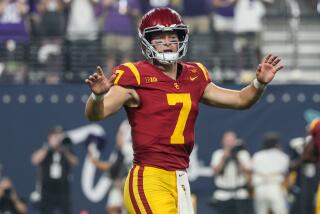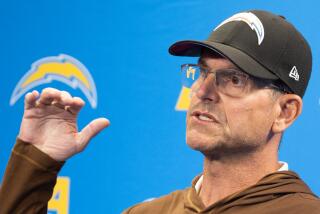Alleged Auburn Violations Detailed : Athletics: Football player, basketball player say they were paid. Coach denies report he was pressured to play whites.
- Share via
AUBURN, Ala. — Auburn University was the target of a double-barreled list of allegations involving payments to athletes, and by a former basketball coach at the school who reportedly said he felt pressure to play whites over blacks, then denied it.
The Birmingham News published a copyrighted story Sunday detailing the contents of tape recordings made by former Auburn defensive back Eric Ramsey of telephone conversations in which Auburn booster Bill (Corky) Frost of Lilburn, Ga., is heard discussing payments on Ramsey’s car and offering meat to stock Ramsey’s freezer.
Ramsey also said that Frost set up a bonus payment system, offering $500 for touchdowns, $200 for interceptions and $100 for each big hit on defense.
The Montgomery Advertiser reported that former Tiger basketball player Chuck Person said in a deposition in a lawsuit involving Birmingham businessman Frelon Abbott Jr. that Glenn Guthrie, a Birmingham stockbroker and Auburn alumnus, gave Person “a couple of hundred dollars” in 1982, his freshman year, and several other payments before his eligibility was up.
Person also said that Abbott gave him money while Person was still at Auburn.
“My understanding was he was a donor for Auburn University and that I was an outstanding athlete there, and I was helped along the way for my contributions to the university,” Person, who plays with the NBA Indianapolis Pacers, said in the deposition.
Abbott sued Person after he selected Herbert Rudoy as his agent before the 1986 NBA draft.
Guthrie and Abbott refused to comment, according to the Advertiser.
In a separate story, the Advertiser reported that Sonny Smith said he felt pressure from fans and alumni to play whites instead of blacks. “I think every team would like to have white players because your fans are white, so you’d like to have some white players on your team because of that,” said Smith, who left Auburn in 1989 to coach at Virginia Commonwealth.
Later Sunday, Smith denied he felt pressure.
“A coach is going to play whoever is going to win the basketball game,” Smith said, speaking by phone from his home in Richmond, Va. “He’d be a fool not to do that.”
Three of his former players--Derrick Dennison, Keenan Carpenter and Melvin Haralson--said Smith yielded to the pressure, favoring white players in practice and in playing time.
“I think Auburn is a great school and I’m not bitter,” Haralson said. “All I can say is that my two years at Auburn University were the worst two years of my life.”
Ramsey’s attorney, Donald Watkins, played six tapes for Birmingham News reporters Thursday, even though the NCAA had asked Ramsey to withhold the tapes while an investigation was ongoing. Ramsey said he knows of at least 15 players who took cash from coaches and boosters during his five years at Auburn.
In a spring 1990 taped conversation, this is heard:
Frost: “Eric, I’ve got a connection up here where I buy these eight to 10-ounce steaks. . . . I buy them by the caseload. I’m going to send you enough steaks to last you about a month at a time, two months at a time.”
Ramsey: “What about the bonus (money) you paid last year? Are you going to cut me out?”
Frost: “No, sir! That’s still good.”
Ramsey: “That’s cool.”
Frost: “You’ll get your bonus from me . . . with the meat. But I don’t want to even hear about it. It would hurt Auburn.”
Frost referred inquiries to his attorney, Dudley Perry Sr. of Montgomery, who has an unlisted telephone number.
Auburn athletic director Pat Dye said he knew Frost, “but I also know about 50,000 other Auburn alumni.”
“But Corky, we had a mutual interest in hunting dogs,” Dye said. “He gave me half interest in a coon dog once--a world championship coon dog that later died.”
Dye said he knew of no relationship between Ramsey and Frost. Dye added that Auburn will accept whatever consequences--if any--resulting from an NCAA investigation.
“We’re going to work hand in hand with the NCAA to try to get to the bottom of the thing,” he said. “If we’re guilty of any wrongdoing, then we have to face the penalty. If we’re not guilty of any wrongdoing, then we want to protect our position.”
More to Read
Go beyond the scoreboard
Get the latest on L.A.'s teams in the daily Sports Report newsletter.
You may occasionally receive promotional content from the Los Angeles Times.










